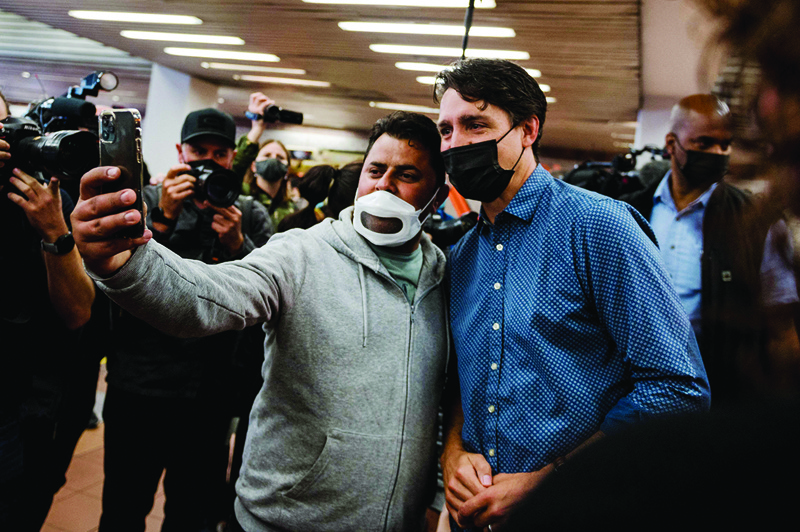 MONTREAL: Canadian Prime Minister Justin Trudeau is seen during a meet and greet with constituents at the Jarry Metro station yesterday. - AFP
MONTREAL: Canadian Prime Minister Justin Trudeau is seen during a meet and greet with constituents at the Jarry Metro station yesterday. - AFPMONTREAL: A beaming Justin Trudeau posed for selfies and bumped elbows with supporters in a Montreal subway station early yesterday, hours after the Canadian prime minister narrowly won a third term in a snap election. "It is I who thank you," Trudeau told a cheering crowd of commuters, who surrounded the prime minister on their way to work and school.
Clad in jeans, sneakers, a blue shirt and wearing a black face mask, Trudeau mingled with his constituents in a subway corridor between two escalators, slipping a few words in French to some and in English to others. "I come from Afghanistan and I am really proud to have been welcomed in your country," a woman in a pink and grey sweater told Trudeau, putting her hand to her heart in a gesture of gratitude.
Soon after, another young woman approached Trudeau and called out to him, "I am counting on you to act for the sake of the environment!" Then, a father slipped next to the prime minister with his three children. One of them, a boy, bumped elbows with Trudeau before giving him a hug.
Greeting constituents in the metro after election day has become a tradition for Trudeau, something he did after his first victory in 2015 and then in 2019. "I am very happy with the way he managed COVID," said Giugetta Iovino. She added that she is "happy to know that it is he who will get us out of there."
But Omar Bencheikh, a 24-year-old immigrant from Morocco, is disappointed and believes the new government won't last more than two years. "For me, the Liberals have not succeeded in their bet because Canada is divided," he said. In his victory speech Monday night, Trudeau promised to lead Canadians "into the brighter days ahead". While thanking his supporters, he also vowed to work for all Canadians. "Because no matter how you voted ... I hear you, I hear you when you say we can only move forward if no one is left behind," he said.
Trudeau called the snap polls last month, hoping to parlay a smooth COVID-19 vaccine rollout - among the best in the world - into a new mandate to steer the nation's pandemic exit and pass his agenda without opposition support. After a bumpy five weeks of campaigning, the one-time golden boy of Canadian politics was able to cling on to power - but emerged weakened.
The Liberals have won or were leading in 158 seats, far short of the 170 needed for a majority, while the opposition Conservatives were heading for 119, according to preliminary results from Elections Canada, with the new parliament set to look little different to the outgoing one.
At 49, Trudeau had faced tougher political bouts and still came out unscathed. After six years in power, however, his administration is showing signs of fatigue, and it was an uphill battle for him to convince Canadians to stick with his Liberals after falling short of high expectations set in his 2015 landslide win.
Entering the final stretch of the contest, Liberals and Conservatives - the two main political parties that have ruled Canada since its 1867 confederation - were virtually tied, with about 31 percent support each in public opinion polls, and four smaller factions nipping at their heels. Pollster Tim Powers predicted a Liberal minority win. "But is that a win for him?" he said, noting that Trudeau had hoped for more than just a plurality of seats.
"In the end, this election was ultimately for nothing," University of Winnipeg politics professor Felix Mathieu told AFP, pointing to the projected seat count for each party as being similar to the split in the last parliament, with most incumbents re-elected.
In a concession speech, Conservative leader Erin O'Toole, 48, recalled Trudeau having pulled the plug on the last minority parliament he said was "unworkable". "But tonight Canadians did not give Mr Trudeau the majority mandate he wanted," he said. "In fact, Canadians sent him back with another minority at the cost of 600 million dollars (US$470 million) and deeper divisions in our great country."
Meanwhile, in Vancouver New Democratic Party leader Jagmeet Singh congratulated Trudeau and vowed to keep fighting on climate change and a range of social issues. "I want you to know our fight for you will continue," said Singh, whose party is looking at 25 seats.
The campaign saw the contenders spar over climate actions, indigenous reconciliation, affordable housing, mandatory COVID-19 inoculations and vaccine passports. At rallies, Trudeau was dogged by what he described as "anti-vaxxer mobs", including one that threw stones at him. O'Toole, meanwhile, was knocked for his backing of Alberta and two other Tory-led provinces' loosening of public health restrictions too soon, with Covid outbreaks now forcing their overwhelmed hospitals to fly patients across Canada for care.
He also fumbled over gun control and was warned by Beijing, according to Chinese state media, that his proposed hard line on China - Canada's second-largest trading partner, with whom relations have soured over its detention of two Canadians - would "invite counterstrikes". Overall, commented Max Cameron, a politics professor at the University of British Columbia, "this hasn't been a polarizing election. There's actually a lot of clustering around the middle."
O'Toole, a relative unknown who became Tory leader only last year, had tracked his party to the political center, forcing the Liberals to compete for votes on the left with the New Democrats and Greens, as well as the separatist Bloc Quebecois. The Conservatives, however, also saw their support clawed by former foreign minister Maxime Bernier's far-right People's Party. - AFP










